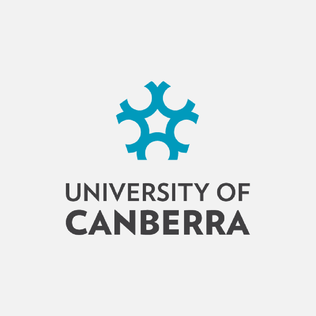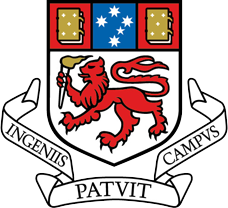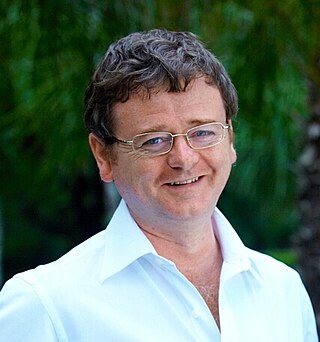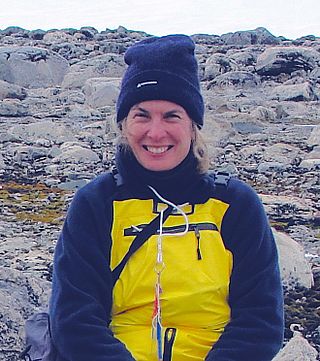
The University of Canberra (UC) is a public research university with its main campus located in Bruce, Canberra, Australian Capital Territory. The campus is 2.5 km (1.6 mi) from Belconnen Town Centre, and 8.7 km (5.4 mi) from Canberra's Civic Centre. UC offers undergraduate and postgraduate courses through five faculties: Arts and Design; Business, Government and Law; Education; Health; and Science and Technology.

The University of Tasmania (UTAS) is a public research university, primarily located in Tasmania, Australia. Founded in 1890, it is Australia's fourth oldest university. Christ College, one of the university's residential colleges, first proposed in 1840 in Lieutenant-Governor Sir John Franklin's Legislative Council, was modelled on the Oxford and Cambridge colleges, and was founded in 1846, making it the oldest tertiary institution in the country. The university is a sandstone university, a member of the international Association of Commonwealth Universities, and the Association of Southeast Asian Institutions of Higher Learning.

Brian Paul Schmidt is an American Australian astrophysicist at the Australian National University's Mount Stromlo Observatory and Research School of Astronomy and Astrophysics. He was the Vice-Chancellor of the Australian National University (ANU) from January 2016 to January 2024. He is known for his research in using supernovae as cosmological probes. He previously held a Federation Fellowship and a Laureate Fellowship from the Australian Research Council, and was elected a Fellow of the Royal Society (FRS) in 2012. Schmidt shared both the 2006 Shaw Prize in Astronomy and the 2011 Nobel Prize in Physics with Saul Perlmutter and Adam Riess for providing evidence that the expansion of the universe is accelerating.

The Australian Centre for International Agricultural Research (ACIAR) is an Australian Government statutory agency that forms part of the overseas aid program in the Foreign Affairs and Trade Portfolio, reporting to the Minister of Foreign Affairs. ACIAR was established under the Australian Centre for International Agricultural Research Act 1982, as amended, to identify agricultural problems in developing problems and brokers Australian agricultural scientists to find solutions.

Distinguished Professor David Lindenmayer,, is an Australian scientist and academic. His research focuses on the adoption of nature conservation practices in agricultural production areas, developing ways to improve integration of native forest harvesting and biodiversity conservation, new approaches to enhance biodiversity conservation in plantations, and improved fire management practices in Australia. He specialises in large-scale, long-term research monitoring programs in south-eastern Australia, primarily in forests, reserves, national parks, plantations, and on farm land.
Anthony John McMichael AO FTSE was an Australian epidemiologist who retired from the Australian National University in 2012.

Terence P. Hughes is a professor of marine biology at James Cook University in Queensland, Australia. He is known for research on the global coral bleaching event caused by climate change. Nature dubbed him "Reef sentinel" in 2016 for the global role he plays in applying multi-disciplinary science to securing reef sustainability. He is an Australian Research Council Laureate Fellow and Director of the Australian Research Council (ARC) Centre of Excellence for Coral Reef Studies. His research interests encompass coral reef ecology, macroecology and evolution, as well as social-ecological interactions. His recent work has focused on marine ecology, macroecology, climate change, identifying safe planetary boundaries for human development, and on transformative governance of the sea in Australia, Chile, China, the Galapagos Islands, Gulf of Maine and the Coral Triangle. His career citations in Google Scholar exceed 88,000.
Marilyn Ball is a professor at the College of Medicine, Biology and Environment at the Australian National University (ANU), and leader of the Ball (Marilyn) Lab for Ecophysiology of Salinity and Freezing Tolerance.

The contributions of women in climate change have received increasing attention in the early 21st century. Feedback from women and the issues faced by women have been described as "imperative" by the United Nations and "critical" by the Population Reference Bureau. A report by the World Health Organization concluded that incorporating gender-based analysis would "provide more effective climate change mitigation and adaptation."
Chennupati Jagadish, an Indian-Australian physicist and academic, is the President of the Australian Academy of Science, and a Distinguished Professor of Physics at the Australian National University Research School of Physics. He is head of the Semiconductor Optoelectronics and Nanotechnology Group which he established in 1990. He is also the Convener of the Australian Nanotechnology Network and Director of Australian National Fabrication Facility ACT Node.

Jan Maree Strugnell is an Australian evolutionary molecular biologist. She is a professor and director in the Centre for Sustainable Tropical Fisheries and Aquaculture at James Cook University, Townsville, Australia. Strugnell's work has investigated population and species level molecular evolution in Antarctic and deep sea species in the context of past geological and climatic change. Strugnell's work also uses genetic tools to help solve bottlenecks in aquaculture and fisheries industries.
David Albert Cooper was an Australian HIV/AIDS researcher, immunologist, professor at the University of New South Wales, and the director of the Kirby Institute. He and Professor Ron Penny diagnosed the first case of HIV in Australia.

Sharon Anita Robinson is an Antarctic researcher known for her work on climate change and bryophytes.

Rachelle Buchbinder is an Australian rheumatologist and clinical epidemiologist. Her clinical practice is in conjunction with research involving multidisciplinary projects relating to arthritis and musculoskeletal conditions. She promotes improvement of communication with patients and health literacy in the community.
Xuemei Bai (白雪梅) is a Distinguished Professor of Urban Environment and Human Ecology at the Australian National University. She was the winner of the 2018 Volvo Environmental Prize, and is the winner of the KIEL Global Economy Prize 2021. She is an elected fellow of the Academy of the Social Sciences in Australia and an ARC Laureate Fellow (2023-). Bai is a commissioner of the Earth Commission, leading a group on methods of cross-scale translation from planetary limits to local actors. She has been named as one of the World’s 100 Most Influential People in Climate Change Policy in 2019 and 2021.

Opha Pauline Dube is a Botswanan environmental scientist and Associate Professor in the Department of Environmental Science at the University of Botswana. She co-authored the IPCC's Special Report on Global Warming of 1.5 °C. She is one of fifteen scientists creating the 2023 Global Sustainable Development Report for the United Nations.

Jessica Fanzo is an American scientist. She is a Professor of Climate and Director of the Food for Humanity Initiative at the Columbia Climate School. Prior to joining Columbia in July 2023, she was the Bloomberg Distinguished Professor of Global Food and Agriculture Policy and Ethics at the Johns Hopkins Berman Institute of Bioethics, the Bloomberg School of Public Health, and the Paul H. Nitze School of Advanced International Studies. She was the first laureate of the Carasso Foundation’s Sustainable Diets Prize in 2012 for her research on sustainable food and diets for long-term human health. In 2024, Fanzo was elected a member of the National Academy of Sciences.
Arun Sharma is an Indian Australian computer science professor. He is a distinguished emeritus professor at the Queensland University of Technology (QUT) where he was the Deputy Vice-Chancellor for Research and Commercialisation from 2004 to 2019. He is the Council Chair of the QIMR Berghofer Medical Research Institute. Within the multinational Adani Group, he is also an Advisor to the Chairman and Group Head for Sustainability and Climate Change. He was a cofounder of Australia's National ICT Research Centre of Excellence (NICTA), and Director of the Translational Research Institute (Australia). In the course of his institutional duties, Sharma played a significant role in the development of Australian technology research capability, the promotion of translational research in agriculture and biosciences within Queensland, and the fostering of international technological research cooperation between Australia and India. Sharma's professional achievements have been recognized by awards by the Premier of Queensland, the Office of the Chief Scientist (Australia), the India Australia Business & Community Awards (IABCA), the Birla Institute of Technology & Science, and the Royal Order of Australia. He was born in the town of Banmankhi in the Indian state of Bihar.
Mario Herrero is a professor of sustainable food systems and global change in the Cornell CALS Department of Global Development. He is also the director of Food Systems & Global Change, a Cornell Atkinson Scholar, and a Nancy and Peter Meinig Family Investigator in the Life Sciences. With a focus on increasing the sustainability of food systems, Herrero has made significant contributions to the field, benefiting both people and the planet.
Brajesh K. Singh is an Indian-Australian soil scientist, ecologist, researcher and academic known for his work in functional ecology, microbiology, and soil biology. Singh is distinguished professor of soil biology at Western Sydney University (WSU)'s Hawkesbury Institute for the Environment, and was the director of the Global Centre for Land-Based Innovation until 2023 at WSU. Singh won the 2023 Dorothy Jones Prize for microbiology, and Alexander von Humboldt Research award in 2019. He is a Fellow of the Australian Academy of Science.











